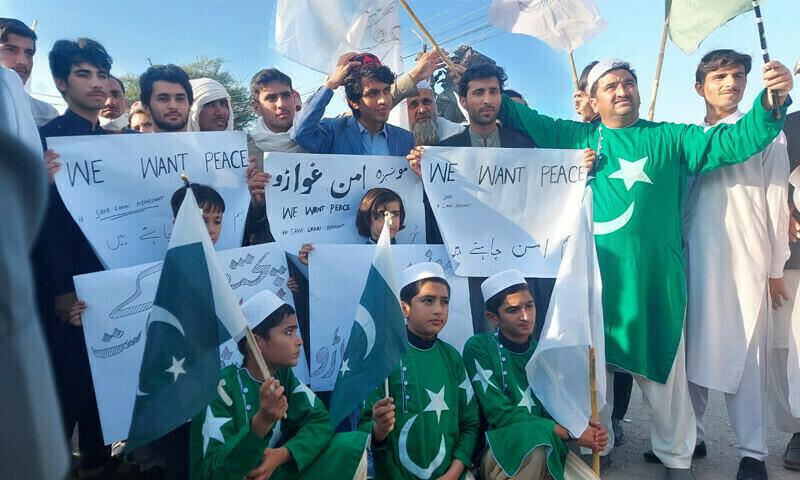People in Pakistan March for peace and it is in response to rising terrorism in Pakistan, especially in the KP Province. Last month, a bombing occurred in a mosque in Peshawar, Pakistan, which killed 101 people, most of them police officers attending afternoon prayer. This attack, claimed by the Tehrik-i-Taliban Pakistan (TTP), has increased the ongoing protests in Khyber Pakhtunkhwa province, where residents are demonstrating their opposition to violence and lawlessness in the area. The Taliban has brokered peace talks between the TTP and Pakistan, but the TTP ended an agreed cease-fire in November 2022, calling for attacks throughout Pakistan. The recent terrorist attacks in the border regions suggest that the TTP has regrouped from inside Afghanistan. The Afghan Taliban regime denies sheltering militants and has condemned the attack in Peshawar.
The blast that occurred on January 30th has fueled ongoing protests in the Khyber Pakhtunkhwa province of Pakistan. The residents of this area have made it clear that they do not want violence or lawlessness to return. This sentiment is particularly strong among Pashtuns.
Following the Afghan Taliban’s takeover of Kabul in 2021, there has been an increase in terrorist attacks in Pakistan, especially in its border regions. In 2014, an offensive targeted TTP strongholds with some success. However, the TTP has claimed responsibility for several terrorist incidents throughout the country in recent months, including a suicide bombing in Islamabad, an attempted attack on a police station in Punjab province, and an assault on a police compound in Karachi last week.
The fact that attacks have spread beyond Pakistan’s tribal areas implies that the TTP, which is aligned with its Afghan counterpart, has regrouped from within Afghanistan. This resurgence in terrorism has caused grievances against both the Afghan Taliban and Pakistan’s military buildup, with protesters claiming that they have contributed to the insecurity in Khyber Pakhtunkhwa and other areas. The Afghan Taliban, which previously enjoyed public support in Pashtun-majority regions of Pakistan like Khyber Pakhtunkhwa, used to recruit fighters for their violent campaigns. However, many people in these areas now resent the group due to the resulting unrest. Last year, the Afghan Taliban mediated peace talks between the TTP and Pakistan, but the TTP broke the agreed cease-fire in November and called for attacks throughout Pakistan.
Residents of heavily militarized areas in KP are experiencing a growing sense of apprehension due to the recent surge in terrorist attacks. Last month, protests erupted in Waziristan following a string of violent incidents. The demonstrators demanded that the government and local law enforcement agencies be given more power to combat the violence. A student, explained that the protests reflected the frustration felt by people living in an area notorious for militancy. He added that grassroots demonstrations had enabled citizens to express their grievances against both the militants and the government.
After the attack on Peshawar, police officers also staged protests to express their frustration over the frequent targeting of security forces by terrorists. The officers complained that they lacked the necessary resources to fight back effectively.
Attacks occurring within Pakistan have caused tension between Islamabad and the Afghan Taliban regime. Although Pakistan initially had friendly relations with the Taliban government, the increased activity of the TTP (Tehreek-e-Taliban Pakistan) has caused Pakistan to reassess its relationship with its neighboring government. The leaders in Kabul have sought international legitimacy by promising not to harbor terrorist groups on Afghan soil, which was one of the preconditions in the Taliban’s 2020 negotiations with the United States that led to the withdrawal of NATO forces from Afghanistan.
Despite the Afghan Taliban’s denial of sheltering militants, a July 2022 report from the U.N. Security Council suggests that up to 4,000 TTP fighters are based across the border in Afghanistan. In response to TTP attacks, the Afghan Taliban’s foreign minister suggested that Pakistan should find its own solution to its security challenges. Meanwhile, the foreign ministry in Kabul condemned the attack in Peshawar and declared such attacks on worshippers to be against the teachings of Islam.
Pakistan must now devise a strategy to deal with the TTP threat, but it is in a difficult position: it may need to seek assistance from high-level Afghan Taliban leaders. The current Pakistani government has chastised Khan’s party for its accommodative approach to talks with the TTP. At the Munich Security Conference last weekend, Pakistani Foreign Minister Bilawal Bhutto Zardari stated that convincing the Taliban to take the threat posed by terrorist groups such as the TTP seriously is critical to bringing the attacks in Pakistan under control.
Pakistan is now dealing with multiple crises, including an ailing economy that makes combating terrorism more difficult. The inability of Islamabad to sustain a costly, protracted offensive against the TTP is hampered by the country’s dire economic situation. And in areas where bloody campaigns against the TTP have long disrupted daily life, the prospect of another campaign is met with annoyance and resistance. Residents of border areas have seen many seasons of violence. They are making their demands known this time.


